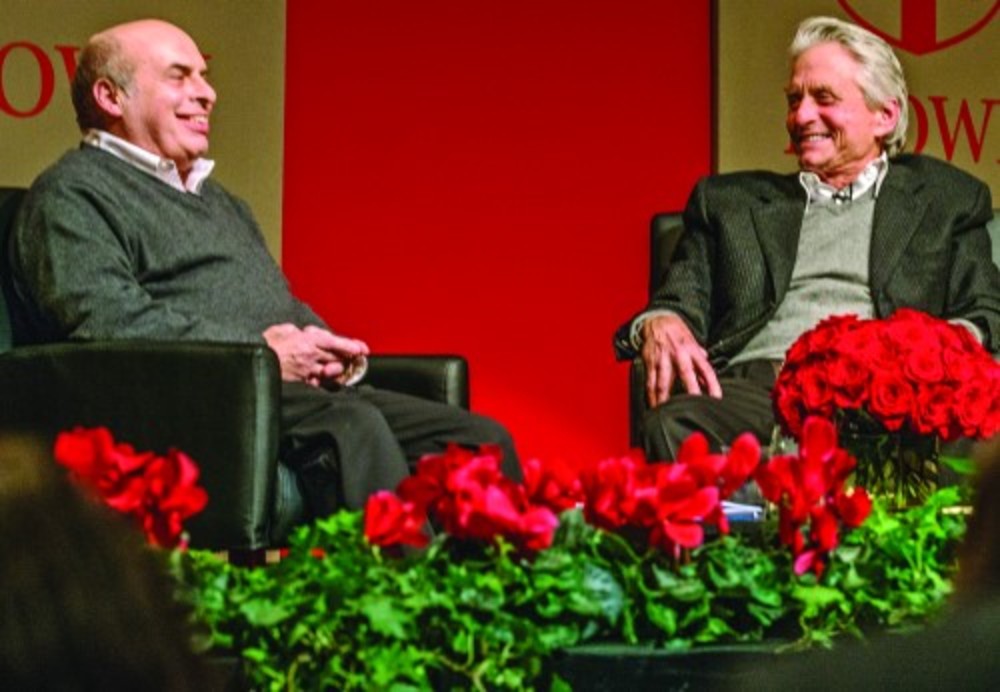An activist and an actor find common ground in their Judaism
 Natan Sharansky and Michael Douglas discuss their “Jewish Journeys” at an event on Jan. 28 at Brown University. /David Delpoio
Natan Sharansky and Michael Douglas discuss their “Jewish Journeys” at an event on Jan. 28 at Brown University. /David Delpoio
PROVIDENCE – Natan Sharansky and Michael Douglas brought stories of their Jewish journeys to Brown University the evening of Jan. 28. Speaking before a packed auditorium at the Salomon Center for Teaching, the renowned Russian activist, who now heads the Jewish Agency for Israel, and the award-winning American actor shared common experiences from widely divergent backgrounds.
The program, designed to bring a pro-Israel voice to several college campuses, attracted a crowd of Brown students and community members. Outside were about 20 protesters, who, at times, shouted “Free Palestine” so loudly that they made the conversation inside difficult to hear.
In what turned into a free-ranging conversation about their feelings about their Judaism, their backgrounds and current events in Israel, Douglas and Sharansky questioned one another on a wide range of topics. Despite their very different lives, the audience could see some common ground.
Douglas, whose father, Kirk, is Jewish, and mother, Diana, was Anglican, said he went through life being told he wasn’t Jewish because his mother wasn’t Jewish. He calls himself a secular Jew who really didn’t think much about his Judaism until his son, Dylan, came to him with questions after spending time with friends who were preparing for bar mitzvahs. Dylan wanted to become a bar mitzvah, Douglas said, not for the presents but because it spoke to him.
“Dylan brought spirituality into our lives,” he said. The entire family traveled to Israel to learn more. Now, Douglas said, “I’m just happy to be part of the tribe.”
Douglas’ story speaks to many who come from interfaith families and don’t think much about their Judaism until a point in their lives when they have to examine who and what they are.
Sharansky, on the other hand, spoke of growing up in the former Soviet Union, where being Jewish meant you had to work harder and be the best. He may not have known about the religious side of Judaism, but he knew being a Jew made him different.
“We knew we were Jews,” he said. “You must be the best. That’s the way you survive.” He talked about how his parents always wanted him to be number one. “I was number one in prison,” he said, getting a loud laugh from the crowd.
Eventually, he became vocal enough about the rights of Soviet Jews that he was thrown in jail for his activism. His is a remarkable story of perseverance. Even his release from prison, 30 years ago this Feb. 11, was the result of continuous efforts by his wife and others around the world.
Douglas was awarded the 2015 Genesis Prize in recognition of his decades-long career as an actor and producer, his work as a peace activist and his unwavering support of Israel. Sharansky is chairman of the prize committee that chose Douglas. Douglas has expressed surprise at winning the award since his mother wasn’t Jewish.
“This was cathartic,” he said.
Though they don’t agree on everything, Sharansky and Douglas’ journeys intersect with their Judaism, and they share many interests, including support of Israel. You could tell that they liked and respected one another and their viewpoints from the easy, conversational tone of the evening.
Some highlights from the Q and A:
Sharansky, who has served in the Israeli government as a member of the Knesset, said he approached the protesters outside the Salomon Center to talk. “They don’t want to talk. They just wanted to shout at me,” he said, adding that they weren’t interested in anything but the destruction of Israel.
Several students in the audience asked questions about the Jewish Agency for Israel’s support of settlements. Sharansky was adamant that JAFI does not support illegal settlements. “We are a unique agency,” he said.
On less hot-button topics, the two were asked about advice for emerging leaders. Sharansky said, “Always remember from where you came. Life is a great thing.” And then he offered some advice from his prison stay: “Nobody can humiliate you. Only you, by your own actions, can humiliate you.”
Douglas offered, “Trust your first instinct. Then stop and analyze it.”
Asked their mantra for living, Douglas answered, “Always think you gave it your best effort.” Said Sharansky: “When you are riding the tiger, the most dangerous move is to stop.”
When questioned about a legacy, Sharansky said, “You want to make the world a better place – tikkun olam – that is the source of power.”
Douglas said, “My father just turned 99. He’s been an inspiration in how he’s lived his life. I hope that I will be able to maintain that level of commitment.”
Douglas has dedicated his $1 million prize to supporting projects promoting the inclusion of intermarried families in Jewish life, including a project by Hillel International, one of the sponsors of this tour.
That project began in 2013 on the Brown campus as “Jews of Brown,” the effort of Rebecca Carrol, an engagement intern at Brown RISD Hillel. The campaign features photographs of Brown students who identify as Jews along with quotes from each about the meaning of being Jewish. Carrol, who spoke before Sharansky and Douglas, graduated in 2015 and is now working on expanding the project for Hillel International. Called “Jews of the University,” it is a social media effort to illustrate the diversity of Jews on college campuses.
Sharansky and Douglas also spoke at Stanford University and the University of California Santa Barbara.
FRAN OSTENDORF is the editor of The Jewish Voice.







